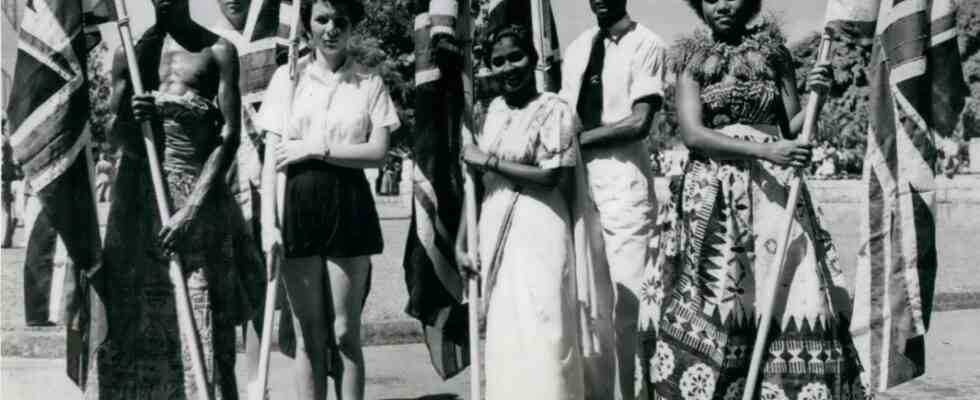Queen Elizabeth II was unable to open the Commonwealth Games in person last week, but her son Prince Charles delivered a message from her. Birmingham is a host city that is “symbolic of the rich diversity and unity of the Commonwealth”. Then it was openly gay water jumper Tom Daley who carried the symbolic baton into the stadium. Also as a sign to the 35 member states of the Commonwealth, where homosexuality is still criminalized.
Outside of the sporting venues, Birmingham’s social messages also catch the eye. On posters, in museums, in the library: the organizers promote open, sustainable Commonwealth Games. Even with more medals for women than for men, also with Paralympic competitions. The games should be inclusive, climate-neutral – and also encourage the British population to exercise more. More than 5000 athletes from 72 countries and territories take part. The English hosts keep emphasizing that the athletes share “common values”. There is less talk of the common, often brutal history.
By the 1920s, when it was at its greatest extent, the British Empire had covered a quarter of the world’s land area. The Indian economist Utsa Patnaik believes that between 1765 and 1938 London alone had raw materials and goods transported to the “motherland” from India alone, which today are worth around fifty trillion euros. Such figures are not part of general knowledge in Great Britain, as a survey by the polling institute YouGov from 2020 suggests: Thirty percent of those surveyed believe that the former colonies under British control are better off today.
1966: Queen Elizabeth delivers her Embassy for the Commonwealth Games in Jamaica.
(Photo: Zuma/Keystone/Imago)
Since the murder of George Floyd by a white police officer in the United States in 2020, there has also been more talk about structural racism in the United Kingdom. But the debate usually remains superficial, says sports sociologist Stefan Lawrence from Newman University in Birmingham: “Several media and politicians want to whitewash history. They only emphasize the supposed achievements. That includes roads that were built in the colonies – and that too belongs to the sport.”
From the middle of the 19th century, British missionaries, civil servants and teachers used football, cricket and rugby as a means of education in the Caribbean, Africa and Asia. The Anglican minister John Astley Cooper claimed in the newspaper in 1891 Great Britain a festival of sport and culture. Cooper desired the promotion of “masculine qualities” such as “courage, selflessness, and companionship”. In an interview he said: “Unless one has lived among blacks, as I have, one cannot imagine what a wonderful moral and disciplinary effect cricket has had on the blacks entrusted to our care.”
The loose Commonwealth of Nations currently consists of 56 countries
The first British Empire Games took place in Hamilton, Canada in 1930. The king made a pathetic speech in London, demanding loyalty from athletes to the crown. After the Second World War, the games grew rapidly and since 1978 they have been held under the name Commonwealth Games. The celebratory reference to the British monarchy declined, however, and numerous countries in Africa declared their independence in the 1960s. The loose federation for the Commonwealth currently consists of 56 countries, including states as diverse as Australia, Rwanda, Cyprus and Samoa. Small islands with a few thousand inhabitants, such as the Isle of Man, Jersey and Guernsey, also take part in the Commonwealth Games.
What credibility can the Commonwealth Games still offer today at a time when states are also deliberately turning away from the association? Barbados has recently become a republic, and Jamaica is pushing for reparations for the British slave trade. “We can use sport to critically debate history and the present,” said Geoff Thompson, Deputy Chairman of the Commonwealth Games in Birmingham. “For me, the real work begins after the competitions. The new infrastructure and the community programs should benefit society in the long term.”
Geoff Thompson is one of those officials who are believed to have made such pleadings. His parents were among the hundreds of thousands who came to Britain from the Caribbean after World War II and helped rebuild the country. Thompson grew up with racism, but as a successful karateka he put on “a protective shield”. As a young man he was active against apartheid. He could well understand that 32 nations boycotted the 1986 Commonwealth Games in Edinburgh because British Prime Minister Margaret Thatcher’s attitude towards the regime in South Africa was not strict enough for them.
Tom Daley at the Opening Ceremony in Birmingham.
(Photo: Hannah McKay/Reuters)
This year the games were supposed to be held on the African continent for the first time, but Durban in South Africa turned down the bid for cost reasons. So now Birmingham, the second largest city in Great Britain, where one in four people was born outside the country. Geoff Thompson is aware that this diversity is also a consequence of imperialism. He refers to the sustainability concept of the games for youth sports, health care, climate protection. And it is reminiscent of the Commonwealth Games in Manchester 2002 and Glasgow 2014. Both cities played an important role in industrialization, both cities lost entire branches of industry during globalization, both cities established sport as an element of urban development.
In Birmingham, too, there was a dispute over millions in funding, and some representatives with a history of immigration did not feel involved. In the British media, there is currently little to learn about it. And also in the cityscape of Birmingham you have to look longer for places that take a critical look at sport and history. The “Pride House”, for example, shows in an exhibition in which Commonwealth countries queer people are denied the right to marry, adopt and do military service. “These laws were often introduced by the British colonial powers,” says Jon Holmes, a staffer at Pride House. But when gay diver Tom Daley performed at the opening ceremony, there was no talk of this information.

